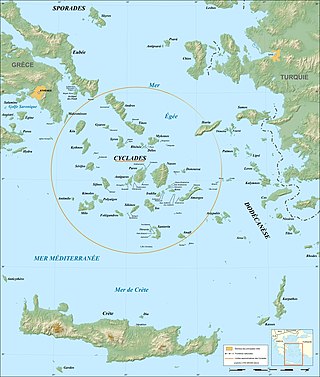Antiquity or Antiquities may refer to:
Antiquity or Antiquities may refer to:
Any period before the European Middle Ages (5th to 15th centuries) but still within the history of Western civilization, including:

The Bronze Age is a historic period, lasting approximately from 3300 BC to 1200 BC, characterized by the use of bronze, the presence of writing in some areas, and other early features of urban civilization. The Bronze Age is the second principal period of the three-age system proposed in 1836 by Christian Jürgensen Thomsen for classifying and studying ancient societies and history.

Classics or classical studies is the study of classical antiquity. In the Western world, classics traditionally refers to the study of Classical Greek and Roman literature and their related original languages, Ancient Greek and Latin. Classics also includes Greco-Roman philosophy, history, archaeology, anthropology, art, mythology and society as secondary subjects.
Greek may refer to:

The three-age system is the periodization of human pre-history into three time-periods: the Stone Age, the Bronze Age, and the Iron Age, although the concept may also refer to other tripartite divisions of historic time periods. In history, archaeology and physical anthropology, the three-age system is a methodological concept adopted during the 19th century according to which artefacts and events of late prehistory and early history could be broadly ordered into a recognizable chronology. C. J. Thomsen initially developed this categorization in the period 1816 to 1825, as a result of classifying the collection of an archaeological exhibition chronologically – there resulted broad sequences with artefacts made successively of stone, bronze, and iron.

Egyptology is the study of ancient Egyptian history, language, literature, religion, architecture and art from the 5th millennium BC until the end of its native religious practices in the 4th century AD. A practitioner of the discipline is an "Egyptologist". In Europe, particularly on the Continent, Egyptology is primarily regarded as being a philological discipline, while in North America it is often regarded as a branch of archaeology.

Classical antiquity is the period of cultural history between the 8th century BC and the 5th century AD centred on the Mediterranean Sea, comprising the interlocking civilizations of ancient Greece and ancient Rome known as the Greco-Roman world. It is the period in which both Greek and Roman societies flourished and wielded huge influence throughout much of Europe, North Africa, and Western Asia.
Classical may refer to:

Cycladic culture was a Bronze Age culture found throughout the islands of the Cyclades in the Aegean Sea. In chronological terms, it is a relative dating system for artifacts which broadly complement Helladic chronology and Minoan chronology (Crete) during the same period of time.
Classical archaeology is the archaeological investigation of the Mediterranean civilizations of Ancient Greece and Ancient Rome. Nineteenth-century archaeologists such as Heinrich Schliemann were drawn to study the societies they had read about in Latin and Greek texts. Many universities and foreign nations maintain excavation programs and schools in the area – such is the enduring appeal of the region's archaeology.

Black Athena: The Afroasiatic Roots of Classical Civilization, its three volumes first published in 1987, 1991, and 2006 respectively, is a controversial book by Martin Bernal proposing an alternative hypothesis on the origins of ancient Greece and classical civilisation. Bernal's thesis discusses the perception of ancient Greece in relation to Greece's African and Asiatic neighbors, especially the ancient Egyptians and Phoenicians who, he believes, colonized ancient Greece. Bernal proposes that a change in the Western perception of Greece took place from the 18th century onward and that this change fostered a subsequent denial by Western academia of any significant African and Phoenician influence on ancient Greek civilization.
The following is a timeline of major events in post-classical history from the 5th to 15th centuries, loosely corresponding to the Old World Middle Ages, intermediate between Late antiquity and the early modern period.

Prehistoric Korea is the era of human existence in the Korean Peninsula for which written records do not exist. It nonetheless constitutes the greatest segment of the Korean past and is the major object of study in the disciplines of archaeology, geology, and palaeontology.
Bryan Ward-Perkins is an archaeologist and historian of the later Roman Empire and early Middle Ages, with a particular focus on the transitional period between those two eras, an historical sub-field also known as Late Antiquity. Ward-Perkins is a fellow and tutor in history at Trinity College, Oxford.
The following outline is provided as an overview of and topical guide to classical studies:

In world history, post-classical history refers to the period from about 500 CE to 1500, roughly corresponding to the European Middle Ages. The period is characterized by the expansion of civilizations geographically and development of trade networks between civilizations. This period is also called the medieval era, post-antiquity era, post-ancient era, pre-modernity era or pre-modern era.
This timeline of ancient history lists historical events of the documented ancient past from the beginning of recorded history until the Early Middle Ages. Prior to this time period, prehistory civilizations were pre-literate and did not have written language.
The expression Ancient Europe may be used in a variety of senses:
This glossary of history is a list of definitions of terms and concepts relevant to the study of history and its related fields and sub-disciplines, including both prehistory and the period of human history.

The ancient Near East was the home of early civilizations within a region roughly corresponding to the modern Middle East: Mesopotamia, ancient Egypt, ancient Iran, Anatolia/Asia Minor and the Armenian highlands, the Levant, Cyprus and the Arabian Peninsula. The ancient Near East is studied in the fields of Ancient Near East studies, Near Eastern archaeology and ancient history.